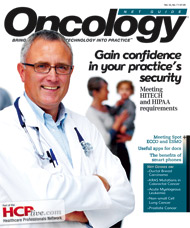Publication
Article
ONCNG Oncology
The new world of Web-based consumer evaluations of physicians
Author(s):
We are all now quite familiar with a number of commercial organizations that claim to provide objective and meaningful evaluations of a variety of common societal activities.
We are all now quite familiar with a number of commercial organizations that claim to provide objective and meaningful evaluations of a variety of common societal activities. Yearly rankings of undergraduate colleges, graduate and professional schools, and hospitals are prominently displayed on newsstands, and depending on where a particular group falls within the “list,” that entity may proudly announce its good fate or respond with absolute silence.
More recently, several Websites that allow members of the public (“consumers”) to evaluate, in a rather unstructured format, the quality of interactions they or their family members have had with physicians have surfaced.1 Is there value associated with such evaluations, and, conversely, is there the potential for harm?
It is important to firmly state that patients, like all members of society, have every right to utilize this forum to express their opinions, and to provide favorable, neutral, or negative commentary regarding interactions with health care providers, just as they may rate movies, plumbers, or insurance agencies. However, the complexity of human illness, particularly serious conditions such as cancer, may cloud judgment and infl uence the objectivity and fairness of the evaluation process; thus, it must also be acknowledged that these sites open the door to disseminating uncensored, misleading, or even fraudulent information.
For example, it is well recognized that if an excellent and caring oncologist informs a patient and the patient’s family that there is no further antineoplastic therapy for the patient’s condition that has any realistic opportunity to produce clinical benefit and recommends a referral to a hospice program, no matter how this discussion is presented, these words may be interpreted as a direct or subtle attempt by the physician to abandon the patient. Conversely, a physician who orders what the vast majority of oncologists would consider to be unnecessary and expensive diagnostic tests, simply because this has been requested by the patient and their family, might be considered by that patient to be a wonderful doctor, even though such actions would objectively not justify this assessment. Yet, the aforementioned medical care scenarios, which may be viewed in a very unfavorable or favorable light, respectively, may subsequently be prominently displayed on an Internet-based physician rating site that includes consumer-based profiles.
The recent exposure of a woman who successfully maintained an elaborate Web-based hoax (viewed by more than one million people) regarding a pregnancy with a terminally ill fetus that resulted in the baby’s death shortly after birth—none of which was true —illustrates the almost certainly unavoidable pitfalls of this expansive form of free speech. While this particular individual was exposed, consider the impact an unsubstantiated claim of substandard care or simply the alleged serious insensitivity of a provider to a cancer patient’s complaints of suffering would have on an individual physician’s reputation and practice.
Again, the issue here is not the right of all members of society to freely express their thoughts regarding the perceived quality of medical care they or others have received. This right and other forms of free speech must be considered fundamental to the values of our society. Rather, the point is to acknowledge the potential impact these individual, personal, and frequently highly subjective statements may have when viewed by hundreds or even thousands of visitors to the site who will likely be presented with only one side of a complex story.
It is not unreasonable for physicians, particularly those who treat patients with complex and emotionally difficult medical conditions such as cancer, to consider strategies to educate the public regarding the difference between a single, or even several, subjective opinions related to patient—physician interactions and on what constitutes more substantive evidence of the quality of health care delivered.
Maurie Markman, MD, is Editor-in-Chief of Oncology Net Guide and Vice President of Clinical Research for University of Texas M. D. Anderson Cancer Center in Houston, Texas.
References
1. Jouret J. Reviewing doctors online. Lancet Oncology. 2009;
10:325-326.
2. Janssen K. Woven on Web, the sad saga of ‘April’s Mom’ only
deceit. Houston Chronicle; June 15, 2009.
